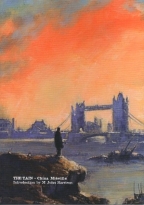The Tain
PS Publishing
UK Hardcover First
ISBN 1-902-88064-1
Publication Date: 11-01-2002
89 Pages; $40.00
Date Reviewed: 03-01-03
Reviewed by Rick Kleffel © 2003
|

|
|
REFERENCES
|
COLUMNS
|
|
Fantasy,
Horror,
Science
Fiction, General
Fiction
|
04-15-02,
05-06-02,
05-09-02,
05-16-02,
06-13-02,
12-13-02,
01-07-03,
01-27-03,
03-26-03, 09-13-03
|
What wine is fine enough to justify a $40.00 per bottle price tag?
How do you pay it, why do you buy it? Sip it once and it is gone.
Only the memory of the experience of consumption remains. There
aren't a lot of copies of PS Publishing's 'The Tain' out and about
and those that are available will cost you at least $40.00 in
hardcover. How do you measure the value of prose per page? The beauty
of the sentence is as fleeting as the taste of fine wine. China
Mieville writes sentences that are worth more than money.
'The Tain' from PS Publishing is usual high-quality piece of
private publishing, with a lovely cover image by new favorite Edward
Miller. Thanks to the publishers and the writer of the introduction,
who cannily advise the reader to avoid the intro until after the
reading is finished. What then could make you want to read an
introduction after you've finished the work? Nothing less than the
writing of M. John Harrison, whose style is as gorgeous as Mieville's
and not too dissimilar.
The work itself is set in a London changed, a Mieville take on
apocalypse. This is not the usual bombs and bullies. Mieville manages
to turn the genre into nothing less than the distilled essence of
pure literary art, complete with references to his predecessors. To
say much more about the content of the work would be to risk ruining
it for the reader. With Mieville, the prose, as always, is the thing.
He can turn a gorgeous phrase and send it skipping across the
lexicons of the literary landscape like a mirror shard hurled at a
mirror. He can conjure effortlessly, slip from the simple into the
surreal with a weightless word or two.
Mieville successfully avoids the trap that genre fiction sets for
its best practitioners. He steps past the snare of
genre-for-genre's-sake and easily writes what feels like simple
fiction. Paradoxically, it's not at all simple, and the strangeness
within unfolds in the reader's brain like the flavor of a fine wine
exploding on the tongue. There, you've had it, it's gone.
But this is book, not a bottle. The pages remain -- beautifully
bound, imprisoned in Miller's gorgeous artwork. Put the book back on
the shelf, give it time to age and mature. Give yourself the same
time. You'll age and mature. Now open up the book again. It's the
best forty bucks you've ever spent.
